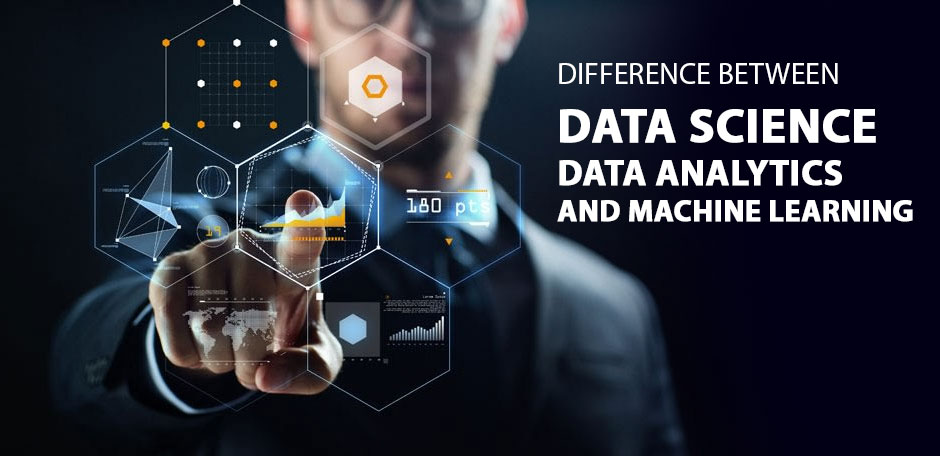Data is ruling each and every bit of our life. The power of data is such that very few organizations can survive in its deficit. It acts as a multiplier of growth in this generation full of uncertainty and acts as a backbone in any kind of decision making. At current, Data related courses have picked an uptrend. Fresher’s and graduates are well opting for this in order to give a better height to their career. Data Science, Data Analytics and Machine learning are all part of it in numerous ways.
Data science:
Data science is an idea used to handle big data which incorporates data purging, arrangement, and analysis. A data scientist assembles information from different sources and applies machine learning, predictive analysis, and sentiment analysis to separate basic data from the gathered data collections. They comprehend information from a business perspective and can give exact forecasts and bits of knowledge that can be utilized to control basic business choices.
It is a lunatic blend of data inference, algorithm development, and technology in order to solve problems that are analytically challenging. At the center is data. Troves of crude data, gushing in and put away in a big business data warehouse. There is much to learn by mining it. Advanced capacities we can work with it. Information science is eventually about utilizing this information in innovative approaches to create business esteem.
Data analytics:
Data analytics (DA) is the process of examining Datasets in order to draw conclusions about the information they contain, increasingly with the aid of specialized systems and Software. Data Analytics technologies and techniques are widely used in commercial industries to enable organizations to make more-informed business decisions and by scientists and researchers to verify or disprove scientific models, theories and hypotheses.
Data Analytics activities can enable organizations to build incomes, enhance operational productivity, upgrade advertising efforts and client benefit endeavors, react all the more rapidly to developing business sector patterns and gain an aggressive edge over adversaries – all with a definitive objective of boosting business execution. Contingent upon the specific application, the information that is broke down can comprise of either authentic records or new data that has been prepared for constant examination employments. Also, it can originate from a blend of inward frameworks and outside information sources.
Machine learning:
Machine learning is an utilization of artificial intelligence (AI) that gives frameworks the capacity to consequently learn and enhance as a matter of fact without being programmed. Machine learning centers on the improvement of PC programs that can get to information and utilize it to learn for themselves.
The way toward learning starts with observations or Data, for example, models, direct experience, or guidance, keeping in mind the end goal to search for designs in information and settle on better choices later on in light of the precedents that we give. The essential point is to enable the Computers to learn consequently without human intercession or help and change activities as needs are.
Difference between the three:
Data science is actually an umbrella that covers all the concepts including data analytics, data mining, machine learning and several other concepts related to it. If we go to a systematic working pattern then, a data analyst first extracts the required information from the given sources and links and after that, a data scientist forecasts the information based on the given pattern. In other words, we can also say that a data scientist creates a question whereas; a data analyst finds an answer to such questions.
Since Data Science is a wide term for numerous controls, Machine Learning fits inside Data Science. Machine learning utilizes different methods like Regression and Supervised Clustering. Then again, ‘Data’ in Data Science could possibly advance from a machine or a mechanical procedure. Along these lines, the primary contrast between the two is that Data Science as a more extensive term focuses on calculations and Statistics as well as deals with the whole information preparing strategy.
Consequently, Data Science can be viewed as a joining of different parental Disciplines, including Data Analytics, Software Engineering, Data Engineering, Machine Learning, Predictive Analytics, Business Analytics, and then some more. It incorporates recovery, accumulation, ingestion, and change of a lot of Data, all things collective, known as Big Data. Data Science is in charge of bringing structure to enormous information, seeking convincing examples, lastly encouraging chiefs to acquire the progressions adequately to suit the business needs. Information Analytics and Machine Learning are two of the numerous devices and procedures that Data Science uses.
Data Science, Data Analytics, and Machine Learning are probably the most sought-after jobs in the business at this moment. A blend of the correct ranges of abilities and certifiable experience can enable you to can anchor a solid profession in these inclining areas.





